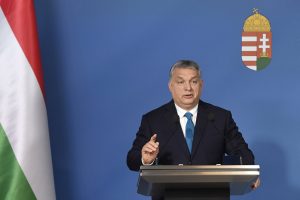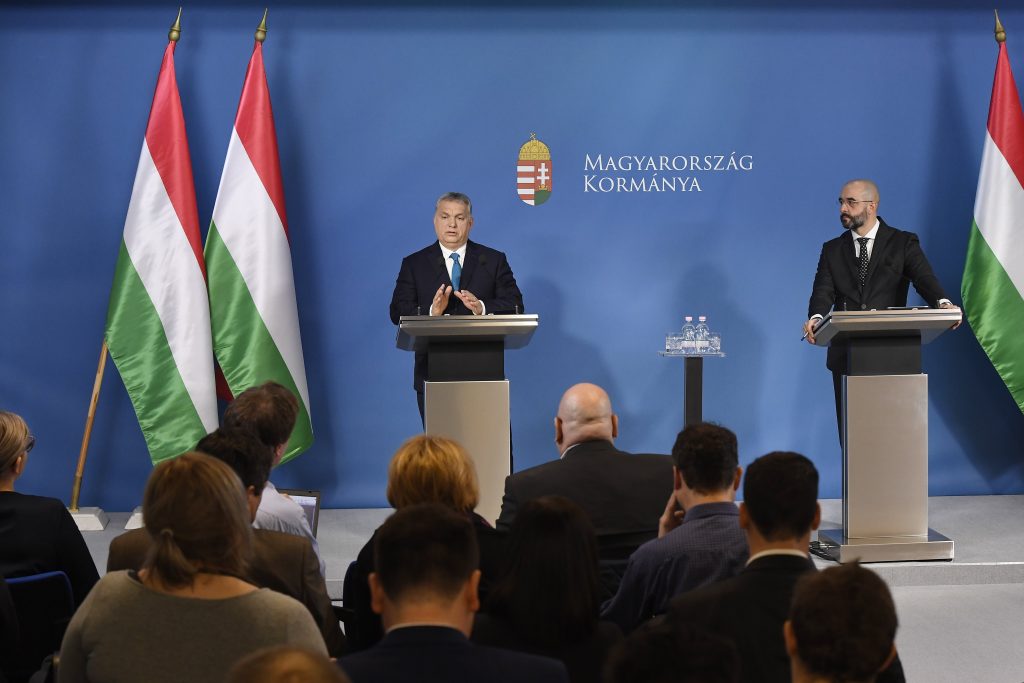Orbán: Migration to be Europe’s defining issue in next 15-20 years – International press conference

Change language:
Prime Minister Viktor Orbán, at an international press conference on Thursday, named immigration as the defining issue of the next 15-20 years in Europe, arguing that the population growth rates of Africa and Asia were higher than their population retention rates.
Hungary can be proud that it was the first country to prove that migration can be stopped on land, and for a long time not even countries with maritime borders attempted to achieve such a feat, the prime minister said. Italian Interior Minister Matteo Salvini was the first to say that this could be done, Orbán said, adding that this had made Salvini a “hero” in his eyes.
Migration has already brought about significant changes in terms of Europe’s future, the prime minister said. In some countries it is already clear that their civilisations will be mixed going forward, and it is only a question of how the people will coexist, he added.
Migration in western Europe is a question of coexistence, Orbán said. But in central Europe the debate is centred on “how we can prevent a situation like the one that can already be seen in western Europe”, he added.
Orbán: Migration profoundly transforming European policies
Migration is not simply an issue that will be in the focus of the European parliamentary elections but one that is profoundly transforming European policies, Orbán said. The traditional division of parties into left-wing and right-wing parties is being replaced by a new division based on being pro-migration or anti-migration, Orbán told a press conference. The debate over migration re-interprets the attitude to Christianity, and almost makes the protection of Christian culture a political duty, he said.
The debate over migration also reinterprets the debate over sovereignty because those who support migration do not respect the decision of those who do not want to take in migrants, he said.
A homogeneous European civilisation is being replaced by two civilisations: one that builds its future on the coexistence of Islam and Christianity and the central European model which continues to conceive Europe “as a Christian civilisation”, Orbán said.
 Orbán: Goal is to have ‘anti-immigration’ majority in all EU institutions
Orbán: Goal is to have ‘anti-immigration’ majority in all EU institutions
Asked about the opposition’s intention to field a joint list for the European parliamentary elections, the prime minister said that if “they take this path, they will be digging their own grave”. Orbán added it was not his job to prevent them.
Asked to comment on an opposition demonstration held in Brussels earlier this week with the participation of Dutch Green MEP Judith Sargentini, Orbán said: “This is yet more proof that migration is the key issue of the EP elections.” He added that Sargentini was “a pro-migration politician, so it is not odd that she is demonstrating against the Hungarian government alongside pro-migration Hungarians.”
Asked about similar protests against right-wing anti-migration governments in Belgrade, Vienna, Warsaw and Rome, he said that pro-migration forces backed by George Soros were preparing for the EP elections and would demonstrate everywhere. “But this is the rule of the game.”
“The campaign has started, there are demonstrations, people compile petitions … we are in campaign mode and it’s guaranteed to be like this until May,” Orbán said.
The prime minister said what was new in the campaign was its international dimension. Orbán named migration as the campaign’s single most important issue, saying it would be the decisive factor for voters.
Asked about recent cooperation between Hungary’s leftist parties and conservative Jobbik, Orbán said the left should consider whether it was right to “legitimise–out of short-term political interest–those who represent anti-Semitism”.
Concerning US billionaire George Soros, he said people who “defend him by referring to his [Jewish] origin” did a disservice both to Hungarian politics and Soros himself.
Referring to the French president, Orbán said Hungary duly respected France and its president, “but we cannot conceal the fact that Emmanuel Macron is a pro-migration forces leader”.






